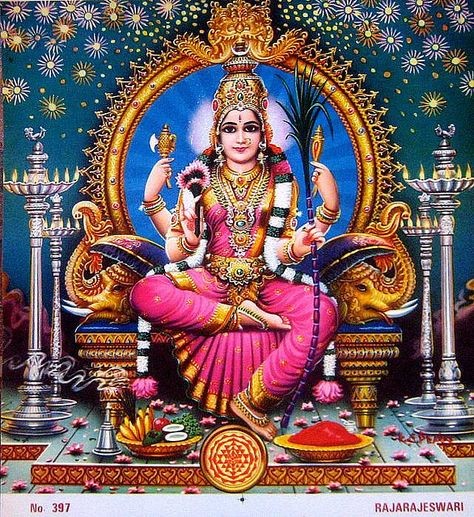The Goddess Divine Mother bestows merit on anyone who hears of Her glories and praises Her.
The Divine Mother grants punya to those who praise and hear Her glories. Those who discuss devotionally and sing Her glories gain punya. For those who hear such of the glories devotionally, the same punya comes in. People who are thinking of the Divine Mother always reach and merge with Her. Their punya increases. The interpretation of this Nama is that who discuss and those who hear the glories of the Divine Mother are gaining punya.
Shravana is hearing the glories of the Divine Mother, kirtana is own singing of the Divine Mother’s glories. These things are possible for someone due to accumulated punya from earlier births. Such opportunities will induce the person to sing Her glories more, resulting in further gains in punya for him. Also, his evil thoughts and previous birth vasana ill effects will be eliminated from him and his good thoughts to sing the Divine Mother’s glories will increase. The Divine Mother grants such merits to righteous persons.
Let us praise Her, at least during those times when evil thoughts enter our minds. Freeing the mind from unclear thoughts is meritorious. These unclear thoughts and activities are known as sin. “Through eighteen Puranas, Vysas said just one thing: serving others is punya, hurting others is papa (sin).”
Those who hear of and praise the glories of the Devi attain merit. In them, there exists no thought of hurting others.
There are nine stages of Nava Vidha Bhakti margams, namely:
ShravaNam, Keertanam, NAma SmaraNam, PAda Sevanam, Vandanam, Archanam, dAsyam,
Sakhyam and Atma Nivedanam.
This Nama talks about the first stage of Bhakti in reaching the Divine Mother.
The Divine Mother grants merits/punya to righteous persons.
C N Nachiappun
Singapore, 22 July 2021.
References:
1.
The Thousand Names of the Divine Mother
published in English by Mata Amritanandamayi Center, San Ramon, California,
USA, with Commentary by T. V Narayana Menon
2.
Shri Lalitha Sahasranama Stostram published in
Tamil by N. Ramaswami Iyer charities’ societies, Trichirapalli, India, with
Commentary by C. V. Radhakrishna Sastry.
3.
The Lalitha Sahasranamam published in Tamil by
Shri Ramakrishna Thapovanam, Thiruipparaithurai, Trichy District, Tamilnadu,
India with commentary by Shrimath Swami Sithbavandar



No comments:
Post a Comment